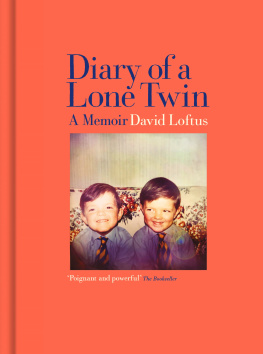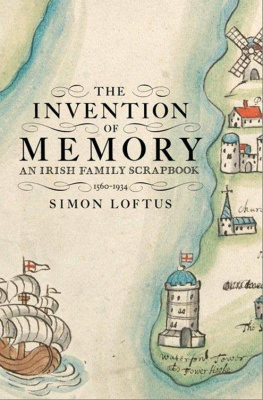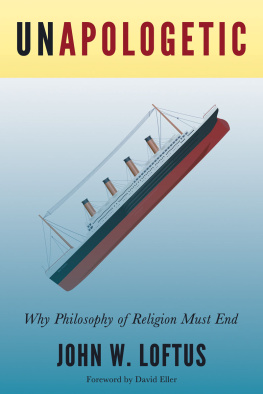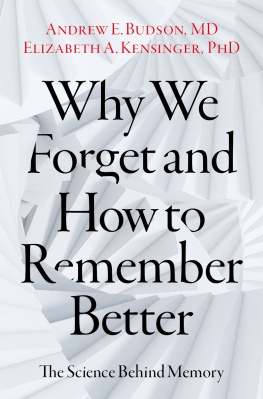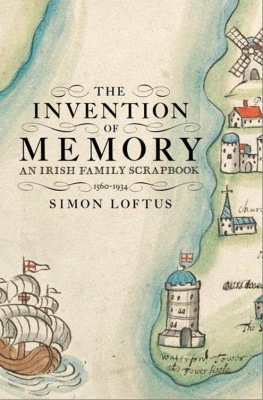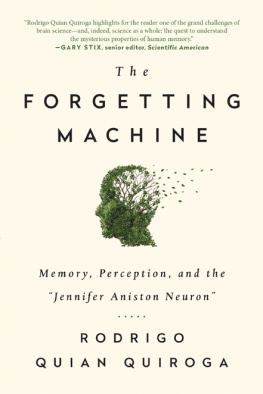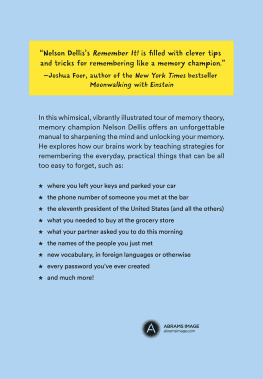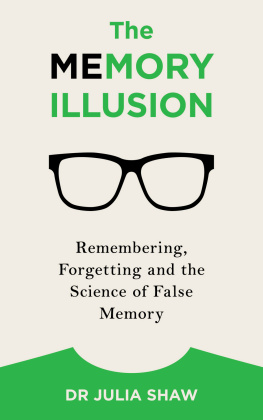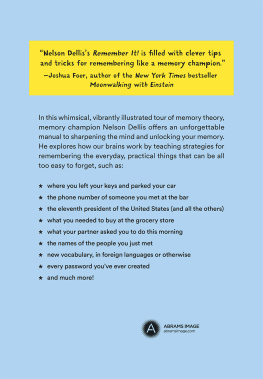Memory
Elizabeth Loftus
Memory
surprising
new insights
into how
we remember
and why
we forget
Elizabeth Loftus

Address orders and editorial
correspondence to:
Ardsley House Publishers, Inc.
320 Central Park West
New York, NY 10025
Copyright 1980, 1988, by Ardsley House Publishers, Inc.
All rights reserved.
Reproduction or translation of any part of this work beyond that permitted by Sections 107 and 108 of the 1976 United States Copyright Act without the permission of the copyright owner is unlawful. Requests for permission or further information should be addressed to the Permissions Department, Ardsley House.
ISBN: 0912675284
Printed in the United States of America
10 9 8 7 6 5 4
To the memory of my mother, who died over twenty years ago, and to my Uncle Joe and Aunt Kitty, who continually helped me to keep that memory alive
Acknowledgments
I owe a great debt to the Stanford University Center for Advanced Studies in the Behavioral Sciences, where in the summer of 1979 I wrote the first draft of this book. Financial support from the Andrew W. Mellon Foundation and the National Science Foundation to the Center is gratefully acknowledged. The National Science Foundation also generously provided a portion of my salary during that time. Dr. James Fries, who really suggested that I write this book, deserves a great deal of thanks. Many other Fellows at the Center similarly inspired my idea. My husband and close friend, Geoffrey Loftus, stood by me through the thick and thin of revising. And finally, I thank the people at Addison-Wesley, especially Warren Stone, Doe Coover, Ann Dilworth, Brian Crockett, and Tess Palmer, for all the work they did to make this a better book.
Also by Elizabeth Loftus
Cognitive Processes
(with Lyle Bourne and
Roger Dominowski)
Eyewitness Testimony
Human Memory
(with Geoffrey Loftus)
Learning
(with Sarnoff Mednick and
Howard Pollio)
Contents
The Power of Memory
How Memory Works
How Memory Doesnt Work
What Causes Forgetting: The Imperfect Mechanism
Mind and Matter: Influences on Memory
Memory in Older People
The Consequences of Imperfect Memory
The Power of Suggestion
Computerizing Memory
Introduction: The Memory Doctor
Memory is something we usually take for granted, but stop for a moment and imagine life without it. Every day we would have to learn everything all over again. We would wake up in the morning, discover the kitchen, find the coffee pot, then the shower. We would have to figure out anew how to get dressed, cook scrambled eggs and toast, drive a car. Life would be a never-ending discovery, exhausting us before we had lasted a single week.
Do memories last forever? Many people believe that everything we learn is permanently stored in the mind, even though particular details may not be immediately accessible. With hypnosis or other special techniques, these inaccessible details could eventually be recovered. As we shall see, this belief is now being seriously challenged. New studies suggest that our memories are continually being altered, transformed, and distorted. After nearly a century of experimental research, psychologists are beginning to discover a great deal about this and other aspects of mental life. The work advances at a snails pace, however, for the scientist who attempts to study the human mind resembles a burglar attempting to open the vault of one of the worlds major banks with a toothpick.
What are the consequences of the malleability of memory? One way to answer this question is to assume hypothetically that people have the potential for total mind malleability. Imagine a world in which people could go to a special kind of psychologist or psychiatrist a memory doctor and have their memories modified. Imagine clinics that specialize in memory modification treatment. One might go there once a week or once a month to have some particularly difficult memory altered. What therapeutic uses would this treatment have? How would our perceptions of the world change?
One could be treated for depression or feelings of worthlessness; the memory doctor would simply modify the memories leading to these feelings. One could have treatments to eliminate social prejudices; to the extent that these are based on a few incidents involving a unique group of people, the memory doctor could wipe out or alter memory of these incidents. One might also have treatments to increase happiness. If people feel bad because they are worse off than they once were, the memory doctor could eliminate the basis for comparison. And for improving marital relations, the memory doctor could enhance pleasant memories of past events involving the spouse. These memory modification specialists would be omnipotent. They would hold the key to total mind control.
This idea may seem far fetched since we obviously cannot now modify on command. But memory can be modified partially. Every day, we do this to ourselves and others. Each of the above extremes has its own milder parallel today. Our memories of past events change in helpful ways, leading us to be happier than we might otherwise be. It also changes, however, in harmful ways, and can occasionally cause us serious trouble.
About thirty years ago, in his 1984, George Orwell wrote these words:
The control of the past depends above all on the training of memory... [It is] necessary to remember that events happened in the desired manner. And if it is necessary to rearrange ones memories or to tamper with written records, then it is necessary to forget that one has done so. The trick of doing this can be learned like any other mental techniques...
Elizabeth Loftus
University of Washington
1
The Power of Memory
My father died five years ago, after he had engaged unwillingly in a several-year battle with melanomathe deadliest of all the cancers, he called it. As a physician, he knew only too well. Whenever I thought about him the first few years after his death, I could not escape the unpleasant images of his illness. I remembered him in a hospital wheelchair waiting for X-rays; I remembered him leaving the breakfast table unable to eat; I remembered him in bed straining to move. I seemed to remember only the sadness of the last year of his life. I tried not to, but it appeared beyond my control. I wondered whether I was to go through life thinking about my father in only this way.
Then, gradually, my thoughts of him began to include some happier images. I saw him standing in the yard, holding a scrawny cat. I saw him in the living room surrounded by smiling family. I even thought about him holding me on his lap when I was no older than four. As nice as it was to have my unpleasant memories of my father replaced by happier images, I couldnt help but feel that there was something very curious about these memories. And then I discovered that I have photographs of all of them. Pictures of our family when I was four are featured prominently in some old scrapbooks. A photo of him holding the cat has been in my wallet for years. Was I remembering my father or only the photographs of him?
The human mind, holder of vast memories, is intricately constructed. As Cicero said in De Oratore, Memory is the treasury and guardian of all things. Without memory, life would consist of momentary experiences that have little relation to each other. Without memory we could not communicate with one another we would be incapable of remembering the thoughts we wished to express. Without memory, a person would not have the sense of continuity even to know who he or she was. Without a doubt, memory is central to being human.
Next page


